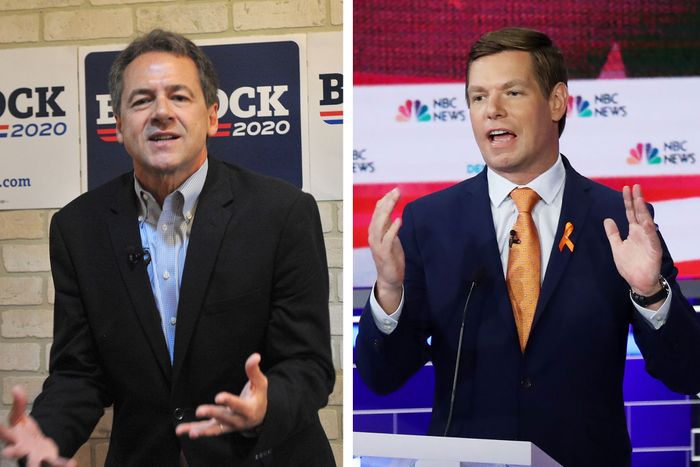
The first round of 2020 Democratic presidential candidate debates have come and gone, and they were consequential. Even if the weekend polls (known to have high margins of error due to lower response rates) showing a complete upheaval in the Democratic race wind up being misleading, there’s no question Kamala Harris and Elizabeth Warren were helped by their performance, while Joe Biden and Beto O’Rourke exhibited some weaknesses.
As the contest moves on to a second round of debates, there’s no way to know if they will be as significant as the first; if history is any indication, the TV audience size will be smaller than for the initial tilts. But there are a number of factors that add to the potential drama, beginning with the determination of who makes the CNN stage in Detroit on July 30 and 31:
1. Some first-round debate participants may be replaced. The process for qualifying for one of the 20 spots did not end prior to the first debate, and at least one new candidate, Steve Bullock, has now met the minimum qualifications for Detroit. Already one first-round participant, Eric Swalwell, is in some peril, as Geoffrey Skelley explains:
Bullock and Swalwell were tied for the 20th and final spot in the debate. Based on the first tiebreaker — the average of each candidate’s top three qualifying polls — the candidates were tied at 1 percent. And based on the second tiebreaker — the total number of qualifying polls in which each candidate earned at least 1 percent in support — Bullock and Swalwell each had three. But there was always a question of how one pollster’s surveys would be counted.
Suffolk University — working in partnership with USA Today — presents two sets of percentages in its survey reports, one rounded to the nearest whole number and one rounded to the nearest hundredth of a percent. For candidates struggling to reach 1 percent, knowing which set of numbers the DNC was going to count has huge implications. For instance, Suffolk’s June national poll had Bullock at 0.52 percent but, rounded up, had him at 1 percent. Now we know the DNC has decided to use the whole numbers for debate qualification.
In an email to the Democratic candidates on Tuesday evening, the DNC said that it had decided to count the rounded numbers for debate qualification. With that decision, Bullock now has four qualifying polls, putting him one ahead of Swalwell and in the debate — for now.
As you can see, making the stage can come down to the splitting of very fine hairs. And with the field now having expanded to 25 candidates, there are others — Seth Moulton, Wayne Messam, Mike Gravel, and Joe Sestak —angling for spots. With new polls coming out regularly, the DNC’s bean-counting of the number of qualifying polls for each candidate may change. And two other candidates, Bill de Blasio and Michael Bennet, have never registered above one percent in a qualifying poll, making them vulnerable to displacement as well.
2. Debate and stage assignments will change, creating new opportunities for drama. We didn’t know until the Friday before the first round of debates who would appear on what night, and where they would appear on the stage. Turns out that did matter, maybe a lot. Would Elizabeth Warren have stood out so clearly on night one had any other top-tier candidate appeared with her? And would Kamala Harris’s challenge to Joe Biden have been nearly so significant if it had not been face-to-face, with Biden being forced to respond? It’s doubtful.
As you may recall, the DNC tried to avoid clustering the top candidates on one night by holding two separate lotteries for debate assignments — one for those polling over 2 percent on average, and one for everyone else. The cookie didn’t crumble as expected, but that could all change with the next luck of the draw. And there could well be candidates who drop in or out of that top tier thanks to new polls. Any way you slice it, the odds of Beto O’Rourke again appearing at the center of the stage (these assignments were and will be made according to poll rankings) are low.
3. Low-ranking candidates may swing for the fences in Detroit. Soon the focus of political observers will shift from initial assessments of the candidate field to the need for some serious “winnowing.” And that will likely happen in any event when the third round of debates arrives in September, with its doubled polling and donor thresholds for participation. Given the typical lull in political engagement during the dog days of August, the Detroit events may be the last chance lower-tier candidates have to achieve some sort of “breakout moment,” worth its weight in gold as a generator of earned media and campaign contributions.
To put it another way, the time for candidates to introduce themselves to the media and the voting public is rapidly expiring. In Detroit, it will be a matter (particularly for the bottom-feeders) of demanding attention via contrived rhetorical stunts and perhaps sharp conflict. In any event, talk of “winners and losers” may change to judgments of “survivors and casualties.”
4. Context could change everything. As always, external events and the “narratives” the moderators bring into the debates are hard to anticipate even a few weeks out. Will Donald Trump carry out his threat to live-tweet the debates in this next round? Could he have us in an international crisis that might significantly elevate foreign policy and national security questions? Will we have a new set of front-runners by the end of this month? All these questions provide a pretty good reason for the politically engaged to tune in.






























